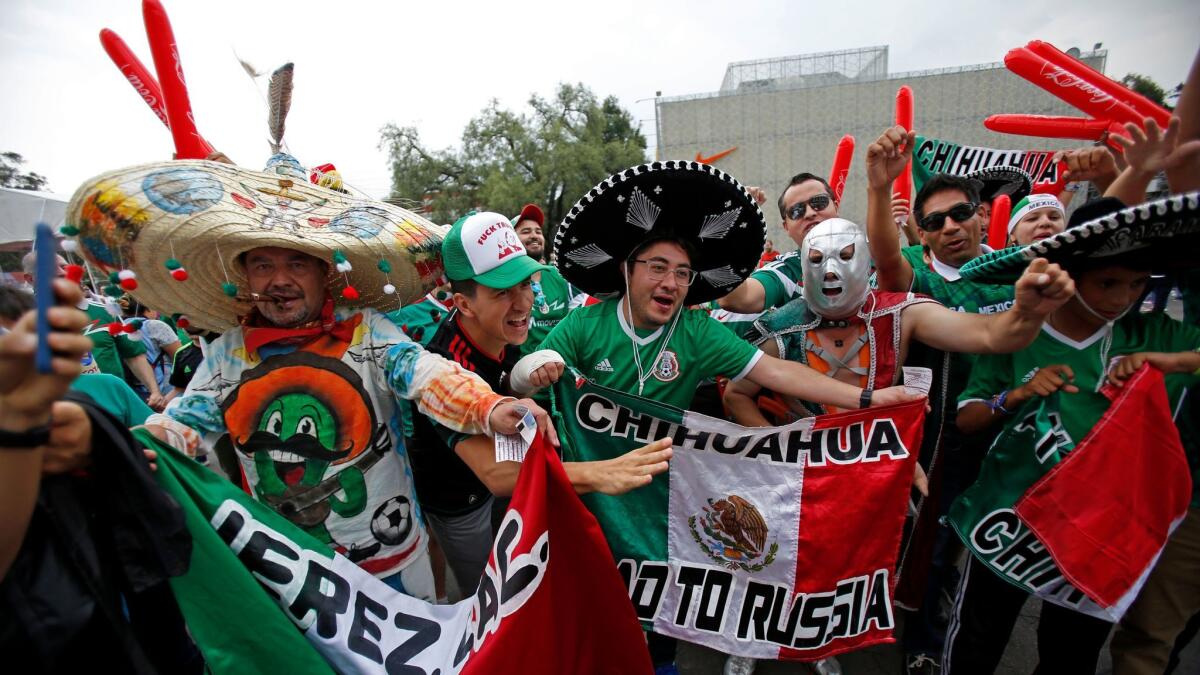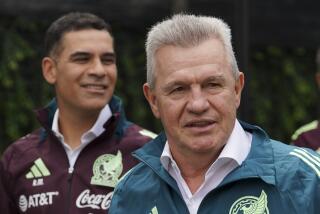A North American rivalry that goes way beyond NAFTA: Mexico and the U.S. go for the goals

Reporting from MEXICO CITY â This was about sports, everyone agreed, about competition on the pitch, about the run-up to the 2018 soccer World Cup in Russia. Not about politics.
But when the U.S. and Mexican national teams clashed here Sunday at the capitalâs celebrated Azteca Stadium, the specter of President Trump and his harsh comments about Mexicans provided a provocative backdrop.
âThis also has to do with Mexican pride,â said Cesar Marquez, 28, who was watching the match on one of the giant television screens set up at a billiards bar in the capitalâs trendy Condesa district. âThe United States may be very strong, but in football, we Mexicans are always better.â
Marquez and his girlfriend, Vanesa Yanez, 23, donned T-shirts with the colors of the Mexican flag, shirts that seemed ubiquitous in the capital on Sunday as fans rooted for the hometown El Tri.
âBetter that Trump know that in football we are better than them,â Yanez said. âWe will show it today!â
Despite the rampant enthusiasm, and clear antagonism toward Trump, it seems fair to say that fans of both sides made an effort to put the politics aside and enjoy the game â the latest incarnation of a fierce rivalry.
That the game ended in a 1-1 tie, while disappointing for many, was certainly a better outcome for Mexican fans than the prospect of a humiliating loss to their great rival.
âTo defeat the United States has always been a great thing,â said Oscar Negrete, 44, an office worker who was watching the game at a restaurant in Condesa. âBut today, victory is an obligation. We cannot lose.â
When the U.S. side scored the first goal just minutes into the match, many here were stunned.
âI was speechless,â said Alfonso Diaz, 33, a software programmer watching the spectacle in a Mexico City restaurant. âWhat a shock that was.â
Calm was restored when the Mexican side tied the score some minutes later.
Much of the commentary on social media here focused on what many viewed as the relative poor play of the Mexican squad, rather than on the political aspects of the rivalry.
Well before the long-anticipated match began, emotions were running high in the capital, where soccer-crazed fans converged on the stadium or headed to bars, restaurants and cafes to view the game. Others planned to watch from their homes, some inviting friends and loved ones and throwing game parties.
The scene at Azteca Stadium, where the match was played, was electric.
A raucous tailgate party outside the stadium featured icy coolers of beer, vendors grilling heaps of taco meat and, this being Mexico, mariachis.
The musicians, decked out in elegant black suits and cowboy boots, played song after song for an exhilarated crowd. At one point, a singer led everyone in an improvised ditty â a clear departure from the traditional mariachi canon.
âWe donât want the wall,â fans and musicians sang together.
Trump has labeled Mexican immigrants as rapists and drug dealers, threatened to impose a border tax on Mexican imports and make Mexico pay for construction of a border wall. He is a much-demonized figure here.
Outside the stadium, Trumpâs face was emblazoned on signs and T-shirts, sometimes along with a middle finger or disparaging comment.
âHeâs trying to destroy my family,â said Agustin Sanchez, 60, who wore the Trump shirt with the extended finger.
Sanchez said he lived in Sacramento for more than 30 years before he was deported to Mexico six years ago. But, like so many others here, he still has lots of relatives in the U.S.
Sunday was about soccer, he insisted, but he wore the shirt to make a point.
âItâs time to fight back,â Sanchez said.
Azteca Stadium is known as an intimidating place for visiting teams, and for their fans.
To cut down on the possibility of violence among spectators, fans for visiting teams are often directed to a swath of seats known as âthe cage.â
This is a section of bleachers up in the nosebleeds that is fenced in with razor wire and guarded by about 200 police officers decked out in riot gear.
The cage is where most of the U.S. fans sat Sunday night â a speck of red, white and blue in a sea of green and red.
Even before kickoff, they traded insults with the Mexican fans on the other side of the fence. The Mexicans booed lustily when the U.S. national anthem played, and the Americans gloated when their team scored.
But when the Mexicans evened the game the stadium rose up with an ecstatic roar, many people throwing full cups of beer into the air to celebrate. Many in the crowd then turned toward the cage, some hurling slurs and raising middle fingers at the Americans.
The riot police looked on nervously.
Alejandro Sioron, 21, wasnât yelling at the Americans. He wasnât chucking empty beer cups their way. His eyes were glued on the field.
âTheyâre so evenly matched,â he said. âItâs thrilling. How could my focus be on the fans? Itâs on the game.â
But he did feel a stirring of nationalism seeing the stadium packed with his compatriots, dressed all in green.
âItâs so emotional, to see so many of my countrymen together,â said Sioron, who works at a car dealership. âItâs beautiful to see.â
With about 10 minutes remaining in the match, a cold rain started to fall.
As fans scrambled to put on plastic ponchos, Alberto Medina kept watching the field. It was still 1-1.
âIâm a little frustrated that we donât have a lead over the gringos,â he said. âWe could still lose.â
Medina, 78, wanted desperately for Mexico to win â because he loved the team, and because he wanted to send a message.
âIt would be a nice little swipe at Trump,â he said.
Still, outright hostility was clearly not the order of the day, another indication, perhaps, of just how entwined these two nations are.
The massive migration of Mexican nationals to the U.S. in recent decades has, in many ways, brought the longtime neighbors closer, despite profound tension about Trumpâs polemical pronouncements. So too has increased economic integration between the two nations that share an almost 2,000-mile border.
These days, relatively few Mexicans donât have relatives or close friends in the United States, or havenât visited the U.S. or lived there themselves. U.S. television shows, movies and consumer products deeply penetrate the Mexican market.
Trumpâs incendiary comments have clearly revived some of the gringo-bashing that was long a feature of the Mexican political scene. But it has generally been muted, with ire focused specifically on Trump and his policies rather than on Americans â or on the U.S. soccer team.
The many social, familial and economic ties between the two nations can sometimes lead to divided loyalties, even for those born in Mexico. Many fans at Sundayâs World Cup qualifying match faced a difficult choice when it came to deciding which team to support.
âI have American kids, and I own an American business,â said Rafael MartĂnez, who was born in Mexico but now runs a restaurant in Manassas, Va. âThat country has given everything to me.⌠My heart is divided.â
But on Sunday, Martinez, 52, was wearing Mexican green. He and a group of friends and family who traveled from Virginia for the game each had a letter printed on their shirt.
Together, the letters spelled out âViva Mexico.â
âItâs where I was raised,â Martinez said of his native land. âIâve gotta support them.â
Martinez brought along his 17-year-old son, Alex, who was born in the U.S. but said he has increasingly found himself defending his familyâs Mexican heritage amid the charged political climate north of the border.
âItâs sad,â Martinez said, adding that he was pleased to be in a place where he could freely celebrate his Mexican pride.
Martinez also brought along the manager of his restaurant, Luke Tamer, 29.
Tamer also donned a green Mexico top. But beneath it was another shirt, this one featuring a bald eagle with Stars and Stripes sunglasses.
âIâm a little undercover right now,â Tamer said, adding that he wore the green shirt to show solidarity with Mexicans.
âIâve had a great trip here,â he said. âWith the kindness of all these people, I donât see how some Americans can be against them.â
Josh Romano, a 45-year-old who lives in Venice Beach, waved one sign that said âImpeach Trump!â
Then he raised another sign, a poster with a photo of one of U.S. soccerâs most famous retired players.
âLandon Donovan for president,â it read.
Romano traveled with an American friend who also toted an anti-Trump sign. He said they felt it was important to show Mexicans that not all Americans support the U.S. president.
âI want the Mexican people to know that our country isnât like that,â he said.
âMost of my friends donât like Trump,â he said. âI definitely donât like whatâs going on in our country.â
twitter: @mcdneville
Twitter: @katelinthicum
--Cecilia Sanchez of the Timesâ Mexico City bureau contributed.
More to Read
Sign up for Essential California
The most important California stories and recommendations in your inbox every morning.
You may occasionally receive promotional content from the Los Angeles Times.











